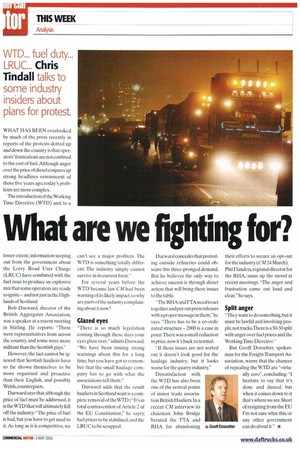What are we fighting for?
Page 20

If you've noticed an error in this article please click here to report it so we can fix it.
lesser extent, information seeping out from the government about the Lorry Road User Charge (LRUC) have combined with the fuel issue to produce an explosive mix that some operators are ready to ignite— and not just in the Highlands of Scotland.
Bob Durward, director of the British Aggregates Association, was a speaker at a recent meeting in Stirling. He reports: "There were representatives from across the country, and some were more militant than the Scottish guys."
However, the fact cannot be ignored that Scottish hauliers have so far shown themselves to be more organised and proactive than their English, and possibly Welsh, counterparts.
Durward says that although the price of fuel must be addressed, it is the WTD that will ultimately kill off the industry: "The price of fuel is bad, but you have to get used to it. As long as it is competitive, we can't see a major problem. The WTD is something totally different. The industry simply cannot survive in its current form," For several years before the WTD became law CM had been warning of its likely impact,so why are parts of the industry complaining about it now?
Glazed eyes
-There is so much legislation coming through these days your eyes glaze over," admits Durward. "We have been issuing strong warnings about this for a long time, but you have got to remember that the small haulage company has to go with what the associations tell them."
Durward adds that the result hauliers in Scotland want is a complete removal of the WTD ("It's in total contravention of Article 2 of the EU Constitution," he says); fuel prices to be stabilised; and the LRUC to be scrapped. Durward concedes that protesting outside refineries could obscure this three-pronged demand. But he believes the only way to achieve success is through direct action that will bring these issues to the table.
"The RHA and FTA need to act together and put out press releases with a proper message in them," he says. "There has to be a co-ordinated structure — 2000 is a case in point, There was a small reduction in price, now it's back to normal.
"If these issues are not sorted out it doesn't look good for the haulage industry but it looks worse for the quarry industry."
Dissatisfaction with the WTD has also been one of the central points of minor trade association British Hauliers. In a recent CM interview its chairman John Bridge berated the PTA and RHA for abandoning A GeoffD their efforts to secure an opt-out for the industry (CM24 March). Phil Flanders. regional director for the RHA, sums up the mood at recent meetings. "The anger and frustration came out loud and clear," he says.
Split anger
"They want to do something,but it must be lawful and involving people,not trucks.There is a 50-50 split with anger over fuel prices and the Working Time Directive."
But Geoff Dossetter, spokesman for the Freight Transport Association, warns that the chances of repealing the WTD are "virtually zero", concluding:"! hesitate to say that it's done and dusted, but when it comes down to it that's where we are. Short of resigning from the EU I'm not sure what this, or any other government ossetter can do about it." •






































































































































































































